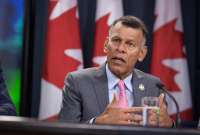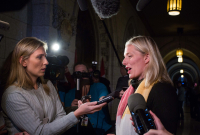Support strong Canadian climate journalism for 2025
Environment and Climate Change Minister Catherine McKenna helped bring more than 25 new governments on board for a Canadian and British push to power past coal on Thursday at international climate change talks.
The new alliance included major industrialized nations in Europe, such as France, Italy, as well as New Zealand and at least one rogue U.S. state, Oregon, that opposes President Donald Trump's approach to dealing with climate change.
The announcement was spearheaded by McKenna and Claire Perry, the United Kingdom's minister for climate change and industry. It forms a broad coalition of countries dedicated to phasing out coal-fired power plants, one of the largest sources of greenhouse gas emissions on the planet.
Apart from the U.S., which has pledged to revive its slumping coal industry, one noticeable absence in the room was Germany, where the climate change negotiations are being hosted this year. Major emerging economies from Asia were also absent.
But both McKenna and Perry said they welcomed other countries to join, noting that some were even joining as they spoke.
"The markets have moved on, the world has moved on, coal is not coming back," McKenna said. "That's really the message we heard here, over and over, in Bonn."
Historic struggle for humanity
For Canada, McKenna said that 90 per cent of the country's electricity generation would be clean by 2030.
The event came one day after German Chancellor Angela Merkel and French President Emmanuel Macron addressed the summit, both noting that the battle against climate change was an historic struggle for humanity.
Several Canadian stakeholders and politicians were on hand for the announcement of the new coalition, including Indigenous leaders, environmental groups, provincial government ministers and representatives as well as officials representing labour unions.
Although the union leaders had expressed frustration with the government, one night earlier, for failing to deliver on key promises to provide support for workers facing layoffs, criticism turned to praise following a seriels of late night phone calls and then a morning meeting with McKenna in Bonn, prior to the announcement.
McKenna stressed that the Trudeau government understood that new policies must ensure that all affected workers experience a "just transition" away from the jobs disappearing from the coal industry. She also committed to implementing a series of measures to support this goal.
This would include a promise not to claw back increased financial aid from the provincial government in Alberta that is offering additional support to laid off workers. The federal government also agreed to develop new mechanisms to provide additional support for the workers, McKenna's office confirmed.
As well, the government committed to creating a new task force, including members from the labour movement, to help it develop new policies to support those that would be losing their jobs. The new task force was expected to launch early in 2018, McKenna told reporters.
"We've also heard that this needs to be a just transition, that we need to be working together with workers and communities and we certainly take that message to heart," McKenna said. "I think this is a strong message to the world. Everyone is worried about workers and communities and wants to grow their economy and create good jobs. And this will do that. There are real opportunities, but there is a transition. And we need to be moving forward."
Labour leader 'extremely happy'
Hassan Yussuff, president of the Canadian Labour Congress, praised McKenna for taking the first steps to support the workers. He said he got a call from McKenna's office soon after National Observer published an article in which he was quoted expressing his frustrations.
But the government was taking action, he explained.
"I'm extremely happy with what the government has agreed to do," Yussuff said in a phone interview from Canada.
"I think it’s a very important commitment to fight climate change, but also to help communities... I’m grateful that this is happening at the time that the workers in Alberta are starting to get laid off."
Labour leaders also said that the work McKenna is doing now can also be shared with other jurisdictions as well as support emerging issues in Canada's oilpatch, which would also face a transition as the world shifts away from fossil fuels.
"We needed the minister to step up and make it clear that the government’s climate change initiatives included just transition and the good news is that she has done that," said Gil McGowan, president of the Alberta Federation of Labour.
"Several (federal) ministries were making excuses for not moving forward, but now the minister has given her commitment that she’s the one who’s going to do that."
Other Canadian stakeholders urged the rest of the world to follow Canada's actions to phase out coal.
Natan Obed, president of the Inuit Tapiriit Kanatami, a national organization representing Inuit in Canada, noted that people in the Arctic have to change their habits because of industrial pollution from coal with mercury contaminants building up in local sources of food.
"We have huge challenges with respect to contaminants," Obed said. "These are things that we didn’t create, but these are things that we are challenged by."
From Yellowknife in the Northwest Territories, physician Courtney Howard said the people in her region are coping with temperatures that are nearly three degrees Celsius above baseline levels.
"We are melting," Howard said. "I had learned to treat heart attacks and strokes, but I wasn’t sure how a doctor was supposed to treat climate change."

Ontario Environment Minister Chris Ballard says it 'can be done'
Also at the announcement, Ontario Environment Minister Chris Ballard said that his own government had demonstrated to other large economies that it's possible to phase out coal power plants. The Ontario government launched a plan to eliminate its dependence on coal nearly a decade ago, culminating with the closing of its last coal power plant in 2014.
“I’m here to tell you that shutting down coal-fired generation plants can be done,” Ballard said.
The shutdown resulted in one of the largest reductions of greenhouse gas emissions in North America, equivalent to removing seven million cars from the roads.
"Our air quality has dramatically improved since cutting out coal fired generation," Ballard added. "In 2005, there were 53 smog advisories issued in Ontario. In 2016, two years after our last plant was closed, there were none. Zero.”
His statement drew applause and some additional nods of approval from Perry and McKenna moments later.
“As we look at images from around the world of cities choking and people choking on coal pollution, this is the opportunity," McKenna said. "There’s a huge economic cost associated with premature deaths, with asthma attacks, the impacts on Inuit. We heard Indigenous people in the north of Canada and there’s the economic opportunity with the market having moved.”
McGowan, from the Alberta Labour Federation, added that the federal government's new commitments to supporting workers in transition were a "huge win" for workers in his home province, as well as across Canada.
"In a nutshell, it looks like Canada is becoming a leader in just transitions in the same way that they’ve been a leader on climate change policy for the past two or three years," he said.
Perry, the UK minister, also noted that the numbers show more and more jobs are available outside of coal.
“In the UK, we now have 430,000 people working in the low carbon economy, directly and indirectly," she said. "That’s a bigger workforce than in the aerospace sector. There are jobs created in all kinds of places — coastal towns like Hull — towns that have struggled for many years."
The International Renewable Energy Agency, an intergovernmental organization, has recently predicted that 24 million people around the world would have renewable energy jobs by 2030.
"This is a completely different economic transition. And ultimately, regardless of the industries that people work in, we all have kids or grandkids or nieces and nephews," Perry added. "Everybody wants cleaner air for the children that they are responsible for and we heard some really powerful statements today. I was really pleased to hear from the health expert about actually just the human cost of this. So I think in a way, thinking about it with the human face, instead of just the economic numbers, is one of the best ways to talk about it to help people with the transition.”
The new coal phaseout initiative puts Canada and its allies at odds with Trump's White House, which has been isolated at the Bonn negotiations. A separate, rogue U.S. delegation is also attending the summit, setting up its own offices in Bonn for the duration of the summit to send a message that many Americans are opposed to Trump's policies and that other levels of government want to pursue the U.S.'s participation in the 2015 Paris Agreement on climate change.
The negotiations are expected to wrap up on Friday as countries strive to reach an agreement on a series of measures to pursue their implementation of the Paris Agreement.
Back in Canada, Yussuff, from the Canadian Labour Congress said that the new measures McKenna promised would also build on the success of her previous work in reaching the Paris deal in 2015, a few weeks after she was first named as the environment and climate change minister.
"This week again and the work she has done in Bonn speaks tremendously to her leadership," Yussuff added. "From time to time, we get frustrated, but there’s no question her leadership is stellar."
Editor's note: This article was updated at 1:25 p.m. ET on Nov. 16 with a new headline and additional comments and reaction from politicians and stakeholders.






Comments
Good for McKenna, and for the workers who will lose jobs. But the next thing is, providing the education and training to transition to the new sustainable, energy conserving society. There are tonnes of possibilities for this, and we should be looking at these right now.
Yussuff should stop stroking McKenna about her coal approach and start asking her when she's going to get tough with her boss about oilsand pipeline subsidies and policies. She should be examining questions relevant to her own mandate such as how this government is going to meet their Paris agreement promises by supporting the building of pipelines from coast to coast. She must know how to spell "hypocrisy" even though she's misspelling it at present. Come on, you guys! Walk your talk! Our great grandkids still have a life to live!
Another example: allowing U.S. coal to be shipped out through Vancouver's port (which, by the way, is managed by a federally-appointed decision-making Port Authority).
U.S. thermal coal is not subject to the provincial carbon tax, which supposedly covers the pollution from mining, processing and transporting useful and still necessary steel-making coal. U.S. thermal coal will pollute our towns and Fraser estuary and coast with toxic coal dust and ultimately trashes our atmosphere when burned in China (comes back to our coast as acid rain) and global climate, leaving taxpayers like you and me stuck with the tab.
Canada looks pretty hypocritical on the coal file, Ms McKenna!
More info: http://bit.ly/2j0Magl
McKenna is truly committed to climate change. She is a first class leader and visionary
The former Conservative government of Stephen Harper came up with a plan to phase out most coal-fired generation. The Trudeau government accelerated it. Ontario has closed its coal-fired plants and Alberta has promised to do the same.
But Canada is not phasing out coal.
First, the federal government plans to exempt coal-fired generating plants that are able to reduce their emissions significantly through new technologies, such as carbon capture and storage. This is perilously close to the notion of clean coal that Trump is mocked for discussing.
Second, Canada continues to mine and export coal for other countries to burn. In 2015, it exported more than 30 million tonnes, mainly to Asian steelmaking plants.
All of which is to say that McKenna’s crusade against coal, while welcome, isn’t exactly as advertised
https://ipolitics.ca/2017/11/13/mckenna-says-climate-plan-prove/
Oooops....wrong link.....here you go:
https://www.thestar.com/opinion/star-columnists/2017/11/14/on-human-rig…
From: Dianne Varga
Sent: November 16, 2017 10:59 PM
To: '[email protected]'; 'MinFinance / FinanceMin (FIN)'
Cc: '[email protected]'; '[email protected]'; '[email protected]'
Subject: coal phase-out
Importance: High
Dear Environment Minister and Minister of Finance:
I’m extremely glad to hear a few things about a coal phase-out. However, I’m curious as to what one critic, Thomas Walkom, said in the Toronto Star about Canada itself not intending to phase out coal.
“First, the federal government plans to exempt coal-fired generating plants that are able to reduce their emissions significantly through new technologies, such as carbon capture and storage. This is perilously close to the notion of clean coal that Trump is mocked for discussing.”
Walkom is right, I think, in holding the idea that clean coal is an oxymoron and that because you clean up after it, at least partially, this does not make it a clean fuel. In the age of transitioning to renewables, shouldn’t Canada get out of the coal business?
“Second, Canada continues to mine and export coal for other countries to burn. In 2015, it exported more than 30 million tonnes, mainly to Asian steelmaking plants."
An obvious question arises: can steel be made without coal? I’m sure the answer to that can be full of complexity, but Coal Action Network of New Zealand has written an article easily understood by a layperson like me, Can We Make Steel Without Coal?, and the answer appears to be yes. Shouldn’t Canada be pursuing or supporting efforts to transition to coal-free steelmaking rather than continuing to mine and export coking coal?
It's also necessary to question how it is that Catherine McKenna is promoting a global coal phase-out at the precise moment the Canada Pension Plan Investment Board is bidding to purchase all of Rio Tinto’s coal assets, to add to the other 35 coal companies the CCPIB has invested in. It’s as if Minister McKenna does not sit in the same cabinet with the Minister of Finance, to whom the CCPIB is accountable. How can one cabinet minister be feeding the beast that another minister is trying to slay?
I look forward to your comments on that matter, as well as on the matter of $3.2 billion of public subsidies continuing to be granted each year to the oil and gas industry. Again, there is a fundamental confusion that surrounds the feeding of the fossil fuel beast in an era of transition.
I look forward to your response to the three issues I have raised: the continuing use of coal and mining and export of coal by Canada, the continuing investment in coal by the CCPIB, and the continuing public subsidies of fossil fuels.
Dianne Varga
Penticton, BC
Coal is just 8% of Canada's fossil fuel use.
In 2015, coal generated less than 10% of all electricity in Canada but was responsible for 77% of related GHG emissions in the electricity generation sector, or 77 million tonnes (Mt) carbon dioxide equivalent (CO2 eq). In 2015, emissions from coal generation plants accounted for around 10.7% of all Canadian GHG emissions.
In 2017, Alberta was still the biggest emitter with 65.7% of all GHG emissions coming from coal-fired generation facilities, followed by Saskatchewan (15.6%), Nova Scotia (12.7%), New Brunswick (5%) and Manitoba (1.1%).
In 2016, Canada's total coal production reached 61 million tonnes(Mt); 30 Mt were exported (and burned in other countries) and 6 Mt imported. Interviewed on CTV's Power and Politics this morning (Nov. 19), Ms. McKenna admitted that Canada has no intention to stop exporting coal, thermal and non-thermal.